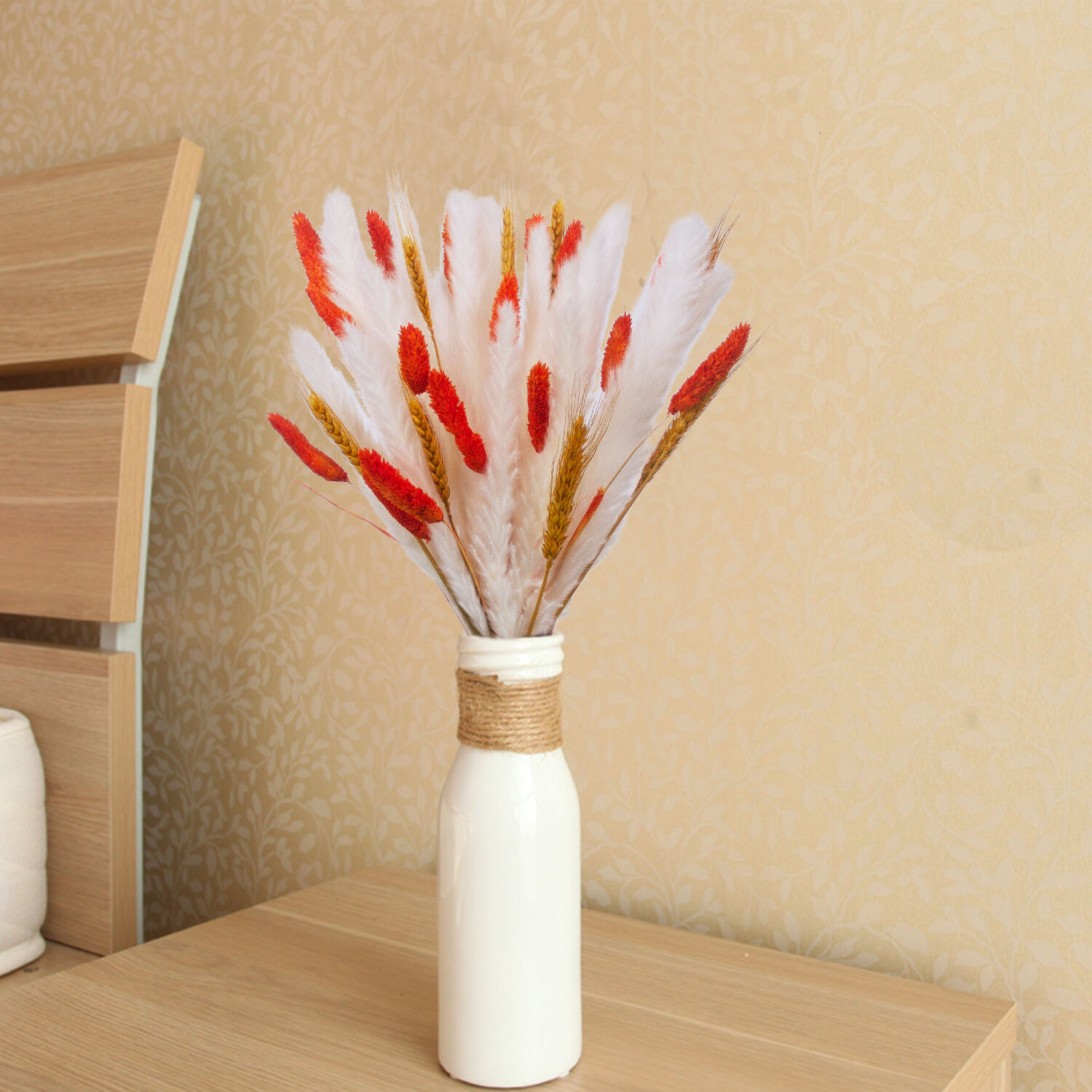
Izpētiet mūsu plašo žāvētu ziedu vairumtirdzniecības izvēli, tostarp pampas zāli un saglabātas rozes. Mūsu saglabātie ziedi ir ideāli piemēroti, lai radītu pārsteidzošas kompozīcijas, kas ilgi saglabājas skaistas jebkurā vidē.
Pēdējos gados saglabātu ziedu nozarē ir pieredzēta ievērojama izaugsme, arvien vairāk uzņēmumu meklē uzticamus saglabātu ziedu piegādātājus, lai apmierinātu pieaugošo patērētāju pieprasījumu. Šie mūžīgie ziedi ir iekarojuši klientu sirdis visā pasaulē, tādēļ piegādātāju izvēle ir kritiski svarīga uzņēmējuma panākumiem. Izpratne par to, kā novērtēt un izvēlēties pareizus saglabātu ziedu piegādātājus, var izšķirt starp prosperējošu uzņēmumu un tādu, kas cīnās ar kvalitātes problēmām un piegādes kavēšanos.
Konservētu ziedu tirgus turpina augt, jo patērētāji novērtē to ilgstošo skaistumu un videi draudzīgo raksturu salīdzinājumā ar svaigi plūktiem ziediem. Mājieniem, pasākumu organizētājiem un dekoratoriem ir kļuvis ļoti svarīgi atrast uzticamus konservētu ziedu piegādātājus, kuri uztur pastāvīgu kvalitātes standartus un nodrošina stabilas piegādes ķēdes.
Izvēloties konservētu ziedu piegādātājus, ir ļoti svarīgi izpētīt to kvalitātes kontroles procesus. Meklējiet piegādātājus, kuri ievēro stingras kvalitātes pārvaldības sistēmas un ir ieguvuši attiecīgus nozares sertifikātus. Labākie piegādātāji parasti īsteno vairākas kvalitātes pārbaudes posmus visā konservēšanas procesā – sākot no ziedu izvēles līdz pat pēdējai iepakošanai.
Profesionāliem sausās ziedu piegādātājiem jāspēj nodrošināt detalizēta informācija par izmantotajām saglabāšanas metodēm, ķīmiskajiem sastāviem un kvalitātes nodrošināšanas pasākumiem. Viņiem jāuztur pienākoša dokumentācija un jābūt pārredzamiem par izmantotajām testēšanas procedūrām attiecībā uz krāsas izturību, struktūras saglabāšanu un kopējo sausās ziedu izturību.
Piegādātāja ražošanas iespēju izpratne ir kritiski svarīga, lai nodrošinātu vienmērīgu piegādi. Jānovērtē ražošanas telpu platība, aprīkojuma sarežģītība un mēneša ražošanas jauda. Vadošie sausās ziedu piegādātāji parasti uztur ievērojamus krājus un ir izveidojuši stabila rakstura attiecības ar vairākiem ziedu audzētājiem, lai nodrošinātu nepārtrauktu izejvielu piegādi.
Ņemiet vērā to piegādes ķēdes izturību sezonas pikā un spēju apstrādāt lielus pasūtījumus, saglabājot kvalitātes standartus. Labākie piegādātāji bieži vien ir paredzējuši rezervētus ražošanas objektus vai partneru tīklus, lai efektīvi pārvaldītu pieprasījuma svārstības.
Premium saglabāto ziedu piegādātājiem jāpiedāvā plašs ziedu šķirņu un krāsu izvēles diapazons. To katalogā jāiekļauj populāras izvēles, piemēram, rozes, hortenzijas un hriazantēmas, kā arī sezonas un eksotiskas šķirnes. Krāsu paletei jāaptver dabiskas krāsas līdz modīgām nokrāsām, nodrošinot vienmērīgu krāsu atbilstību visām partijām.
Meklējiet piegādātājus, kuri regulāri atjauno savu produktu klāstu un var nodrošināt sīkas krāsu tabulas un paraugu komplektus. Tas palīdz nodrošināt, ka varat apmierināt dažādas klientu vēlmes un sekot līdzi tirgus tendencēm.
Pielāgotu saglabāšanas risinājumu sniegšanas spēja izceļ labākos piegādātājus. Viņiem vajadzētu piedāvāt dažādas apstrādes iespējas, tostarp dažādas saglabāšanas metodes, īpašus pārklājumus un konkrētas krāsu apstrādes. Šāda elastība ļauj uzņēmumiem izveidot unikālas produktu līnijas un izpildīt īpašus projektu nosacījumus.
Pieredzes bagāti saglabātu ziedu piegādātāji bieži piedāvā konsultāciju pakalpojumus, lai palīdzētu klientiem izstrādāt pielāgotas specifikācijas to konkrētajām tirgus vajadzībām vai īpašiem pasākumiem.
Novērtējiet piegādātāja cenu modeli un pārliecinieties, ka tā atbilst jūsu biznesa mērķiem. Salīdziniet ne tikai vienības cenas, bet arī minimālos pasūtījumu apjomus, apjoma atlaidis un maksāšanas noteikumus. Uzticami saglabātu ziedu piegādātāji parasti piedāvā konkurētspējīgas cenas, saglabājot kvalitātes standartus.
Ņemiet vērā piegādātāja elastīgumu attiecībā uz maksājumu kārtību un viņu gatavību diskutēt par ilgtermiņa sadarbības noteikumiem. Labākie piegādātāji bieži piedāvā izdevīgus maksājumu noteikumus pastāvējušiem klientiem, vienlaikus ievērojot pārredzamības politiku cenās.
Efektīva pasūtījumu apstrāde un reaģējoša klientu apkalpošana ir būtiski faktori, izvēloties piegādātāju. Meklējiet sausās puķu piegādātājus ar modernām pasūtīšanas sistēmām, skaidrām komunikācijas kanāliem un dediķētiem kontu menedžeriem. Viņu klientu apkalpošanas komandai jābūt produktu zināšanām un spējai ātri piedāvāt risinājumus pieprasījumiem vai problēmām.
Profesionāli piegādātājiem jānodrošina visaptveroša pasūtījumu izsekošana, detalizēta dokumentācija un ātra reakcija uz kvalitātes problēmām vai piegādes vaicājumiem.
Vadošie saglabāto ziedu piegādātāji bieži piedāvā plašas produktu zināšanas un apstrādes norādījumus. Viņiem vajadzētu nodrošināt apmācību materiālus, seminārus vai tiešsaistes resursus, kas aptver pareizu uzglabāšanu, apstrādi un izstādes tehnikas saglabātiem ziediem.
Meklējiet piegādātājus, kuri regulāri dalās ar nozares ievērojamību, tendenču ziņojumiem un tehniskajām atjauninājumiem, lai palīdzētu saviem klientiem saglabāt konkurētspēju tirgū.
Labākie saglabāto ziedu piegādātāji iegulda nepārtrauktā uzlabošanā un inovācijās. Viņiem vajadzētu būt veltītiem P & I komandām, kas strādā pie jaunām saglabāšanas tehnikām, krāsu attīstības un produktu pielietojumiem. Šāda saistība ar inovācijām palīdz nodrošināt, ka viņu klienti paliek priekšā tirgus tendencēm un patērētāju vēlmēm.
Ņemiet vērā piegādātājus, kuri aktīvi piedalās nozares pētījumos un regulāri ievieš jaunus produktus vai uzlabotas saglabāšanas metodes.
Minimālais pasūtījumu apjoms atšķiras starp saglabāto ziedu piegādātājiem, parasti svārstās no 100 līdz 500 stublājiem uz katru šķirni un krāsu. Daži piegādātāji piedāvā mazākus MOQ lielumus paraugpasūtījumiem vai jauniem klientiem, savukārt citi var prasīt lielākus apjomus pielāgotiem saglabāšanas projektiem.
Augstas kvalitātes saglabātie ziedi no uzticamiem piegādātājiem var saglabāt savu izskatu vienus līdz trīs gadus, ja tie pareizi uzglabāti un izstādīti. Ilgtspēja ir atkarīga no vides apstākļiem, apstrādes prakses un izmantotās saglabāšanas metodes.
Svarīgi sertifikāti, kurus meklēt, ietver ISO 9001 kvalitātes pārvaldības sistēmām, vides sertifikātus, piemēram, ISO 14001, un konkrētus nozares standartus saglabāto ziedu apstrādei. Piegādātājiem jāatbilst attiecīgajām drošības un ķimikāliju izmantošanas regulām mērķa tirgos.